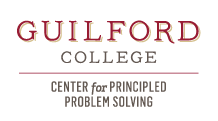
Ethical Leadership Programs
Five programs put the Ethical Leadership ethos into study, reflection, and practice: Bonner Leaders, Quaker Leadership Scholars Program, Principled Problem Solving Scholars, Multicultural Leadership Scholars Program, and Ethical Leadership Fellows. The EL programs as a whole align closely with the college’s core values of community, stewardship–the careful and responsible management of resources entrusted to one's care. Specific EL programs also elevate one or more of GC’s other core values–Community, Diversity, Equality, Excellence, Integrity, and Justice.
Distinguishing EL Programs and Efforts
Each program focuses on a particular element of ethical leadership. Students apply to and are selected for the ethical leadership program which best aligns with their interests and goals.
Bonner Leaders: Civic Engagement, Community Service, and Social Action
Quaker Leadership Scholars Program: Social Justice and Community Building spiritually rooted in Quaker values, traditions, and spiritual practices
Multicultural Leadership Scholars Program: Understanding and embracing cultural variety and significance.
Principled Problem Solving Scholars: Detection and solving challenges through an ethical lens
Ethical Leadership Fellows: Cultivating and applying personal, interpersonal and professional ethics for mutual benefits across fields
What makes for a great Ethical Leader?
Each of these programs seek qualities like:
A commitment to community-centered service
A commitment to social justice
Awareness of cultural heterogeneity
Self-reflection, especially around our purpose and calling
The ability to address complex challenges through the lens of ethics
An intention to apply ethical responses to practical challenges in the field
Understanding our personal impact on others through our identities, communication, and actions.
What do students do in these programs?
Participants in each program:
Do a deep dive into their focus area, spending four years learning about the subject in depth. (Principled Problem Solving Scholars do this in one semester)
Put theory into practice by participating in service, community, or educational activities.
Offer presentations, programs, or events to engage the wider campus in each EL focus area

